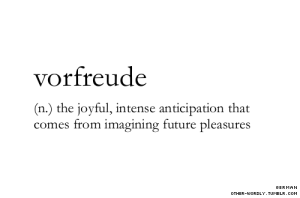Love in the past is a memory. Love in the future is a fantasy.
To be really alive, love — or any other experience —
must take place in the present.
~Jack Kornfield
I don’t want to get too caught up in what’s next. I want to enjoy what’s now. (While still excited about what’s next.)
I’ll admit that’s been hard the past few months. After a period of dormancy, my life is in the full bloom of spring. It’s glorious. I have big plans and I’m working toward them day by day. Still, I find myself saying things like, I can’t wait until…
Now, I want to be clear: There’s absolutely nothing wrong with being excited about the future, no matter whether future means five years or five minutes. But being too caught up in future happiness – or past, for that matter – makes you miss opportunities for joy and growth in the current moment.
Happiness is not something far away. It is to be found neither in
fame nor in popularity. When you live with integrity,
your hearts begin to fill with a happiness as vast as the universe.
It’s about being true to yourself and starting from where you are.
~Daisaku Ikeda
Where are you?
There’s risk living fully in the present moment. You have to be open. Vulnerable. You have to face life as it is, not as you would have it be, or as it used to be. It requires acknowledgment. Discernment. And it’s a balancing act, really. Reflecting on past moments, looking forward to future moments, all while living in the now, is more than a notion.
That’s really a challenge if you feel your life is a smidgen too far from perfect. Why focus energy here and now, when you really want to just hurry up and get to happily ever after? And if life is good now, but better is just around the corner, it’s easy to want to rush time along. Funny thing, time. You can’t get to future moments without experiencing this one. And because the chain of cause and effect is never broken, the way you experience the future is predicated, in large part, on the way you frame your present adventures.
Mindful moments.
One way I’ve remained mindful of (and grateful for) present moments, is by adding to my joy jar. I could do this more often, and I’m writing about it now as a gentle reminder to myself. Another strategy I implement is listing. I jot down small, specific tasks I want to accomplish in a short period (one day or two), and check them off as I go. It’s simple, but it allows me to see and appreciate constant progress, and consequently build momentum.
I also enjoy simple things like outdoor exercise, sitting in the sun, stretching, or salt baths. These all help me slow down and notice what’s going on right now. They also help me listen to my body, which whispers its need of rest or better nutrition before turning to drastic measures like illness or injury.
 Cultivate your life.
Cultivate your life.
My aunt is a Master Gardener. And no matter how excited she is about her future blossoms, there’s no escaping today’s work of tilling the soil, planting and pruning as the case may be. She enjoys the work of gardening (even the setbacks), the anticipation, and the fruits of her labor.
And so it can be with us.
